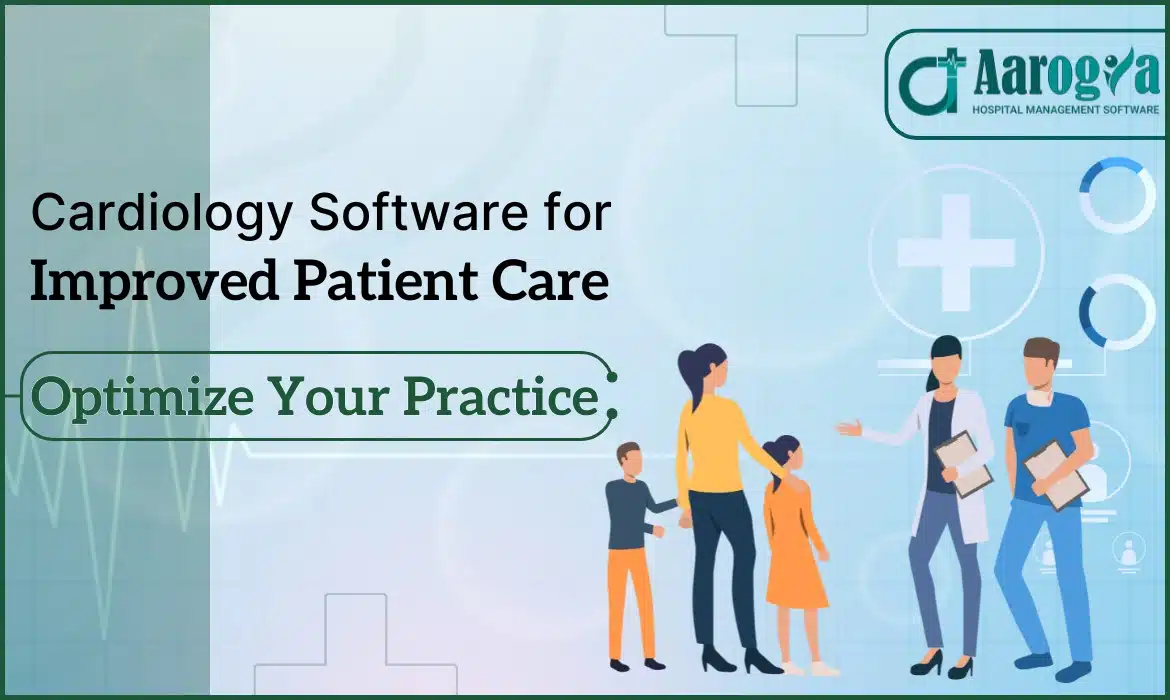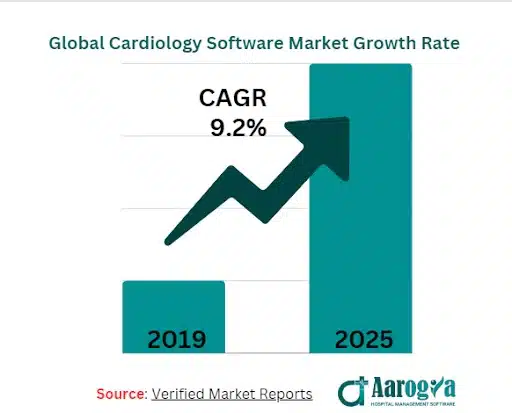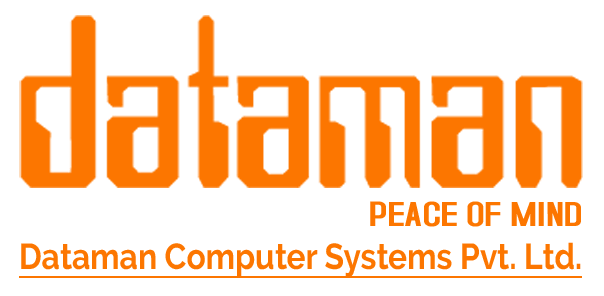- +91 9511117684
- shweta@dataman.in

Table of Contents
Post Views: 13,565
Cardiology is the branch of medicine that deals with heart diseases and conditions. As cardiovascular diseases are one of the leading causes of death globally, cardiology is a critical department within any healthcare institution. A significant rise in heart patients has been observed, particularly after COVID-19, highlighting the importance of effective management and treatment. Management tools like cardiology software are being adopted widely by healthcare providers of all sizes.
As per Verified Market Reports, the global cardiology software market is expected to register a CAGR of around 9.2% during the forecast period 2019 – 2025. The market size is expected to reach USD 4.2 billion by 2025.

What is Cardiology Software?
Cardiology software is a comprehensive digital tool designed to assist cardiologists in diagnosing, treating, and managing heart conditions. Basically, the software is for the management of the entire cardiology practice.
Cardiology software can be used for a variety of purposes, including:
- Storing and managing patient medical records
- Analyzing data from cardiac imaging tests, such as electrocardiograms (ECGs), echocardiograms, and cardiac MRI scans
- Helping to develop treatment plans
- Monitoring patients’ progress over time
Different Types of Cardiology Software
There are several types of cardiology software, each serving a unique purpose. The practitioner can opt for either complete cardiology software solution or any type of the software as per their requirements. The types of cardiology software include Electronic Health Records (EHR) software, Electronic Medical Records (EMR) software, medical software tailored specifically for cardiology, and reporting software that helps in documenting and analyzing patient data.
Cardiology EHR Software
EHR, or Electronic Health Records, are digital versions of patients’ medical records. These records are added or updated in real time which ensures accurate information available instantly and securely to authorized users.
Cardiology EHR software includes features such as comprehensive patient records, appointment scheduling, billing, prescription management, and diagnostic tools specific to heart health.
The benefits of cardiology EHR software are numerous. They include improved patient care through accurate and complete patient information, better care coordination, and enhanced security of patient data.
Cardiology EMR Software
EMR, or Electronic Medical Records, are digital versions of patients’ medical records that are also done by EHR software but the difference between EMR and EHR here is that EMRs contain the medical and treatment history of patients in one practice or hospital facility.
Cardiology EMR software often includes patients’ records management, E-prescriptions, clinical notes, medication management, and integration with diagnostic equipment such as ECG and echocardiography machines.
Benefits of using EMR software in cardiology include streamlined workflows, reduced paperwork, improved patient follow-up and tracking, and enhanced diagnostic accuracy.
Cardiology Medical Software
Cardiology medical software refers to specialized programs used to support various cardiology-related functions, including diagnostics, treatment planning, and patient monitoring.
Key components of cardiology medical software include diagnostic tools, treatment planning modules, patient management systems, and data analytics features.
This software supports cardiologists by providing tools that enhance diagnostic accuracy, streamline administrative tasks, and facilitate better patient outcomes through detailed analytics and reporting.
Cardiology Reporting Software
Cardiology reporting software is designed to create detailed reports on patient diagnostics, treatment outcomes, and overall practice performance.
Core features include customizable report templates, integration with diagnostic devices, real-time data analytics, and secure data storage.
Advantages include improved accuracy in diagnostics and treatment planning, efficient data management, and enhanced ability to track patient progress and outcomes.
Key Features to Look for in Cardiology Software
User-Friendly Interface
A user-friendly interface ensures that the software is easy to navigate and use, which is crucial for busy cardiology practices. Reputed vendors provide training and support to doctors and their staff so that they can easily navigate through the software.
Integration Capabilities
A robust system effortlessly integrates with existing systems in the hospital like pharmacy software, lab management software, radiology software, blood bank management software, payroll software, inventory management software, etc.
Security and Compliance
Ensuring that the software is compliant with regulations such as DISHA, HIPAA, HL7, EHR Standards, etc. is critical for protecting patient data and maintaining trust.
Customization Options
Many cardiologists have specific needs based on factors like hospital size, patient flow, equipment, and staffing. Therefore, the software should be customizable to meet their exact requirements. Additionally, it should be scalable to accommodate future needs.
Support and Training
Training and support are crucial because every software has a different interface and functionalities. By providing training, vendors ensure users are comfortable with the cardiology software. For any critical issue, users can always seek support from the vendor.
How to Choose the Right Cardiology Software for Your Practice
Assessing Your Needs
Begin by assessing the specific needs of your practice, including the types of patients you see and the services you provide. For example, when a patient enters the clinic they should be registered in your system, management of inventory in your clinics, pharmacy management, lab management or integration with lab management software.
Evaluating Different Solutions
Look at various cardiology software options available in the market, comparing their features, ease of use, and overall functionality. Also, check their after-sale support and cost.
Considering Cost vs. Benefits
Consider the costs of the software against the benefits it provides, including potential improvements in efficiency and patient care.
Check Reviews and Seek Recommendations
Get reviews from other cardiologists and seek recommendations to find reliable and effective software solutions that can be adopted keeping in view future requirements.
Common Challenges and How to Overcome Them
Technical Issues
Technical issues can arise with any software. Make sure there is a dedicated IT support team that can help quickly resolve these problems before choosing a cardiology software.
Resistance to Change
Resistance to change is natural. New types of requirements from the doctor’s side and technologies to overcome those will come with time. To address such concerns take training, involve in clear communications, and ask to demonstrate the benefits of the new software.
Ensuring Data Security
Maintaining data security is critical. Use software with robust security features and regularly update your systems to protect patient information.
Also Read: Choosing the Right Pathology Lab Software
Conclusion
Cardiology software solutions are no longer optional for cardiology practices. By implementing a robust and user-friendly system, you can streamline workflows, enhance patient care, and optimize your practice’s efficiency. Carefully analyzing your specific needs and choosing the right software can significantly improve your practice’s operations, enabling you to focus on delivering exceptional cardiac care.
FAQs
What is the difference between EHR and EMR?
EHRs are comprehensive patient records accessible by multiple healthcare providers, while EMRs are digital versions of paper charts specific to one practice.
How does cardiology software improve patient care?
Cardiology software improves patient care by providing accurate, up-to-date patient information, facilitating better diagnostic and treatment decisions, and enhancing communication between healthcare providers.
What are the costs associated with cardiology software?
Costs can vary widely depending on the features and capabilities of the software. It’s important to consider both the initial investment and ongoing
What are the different types of cardiology software available?
There are various types, including EHR/EMR, reporting software, diagnostic tool integration modules, and patient portal solutions.
What are the key benefits of using cardiology software?
Improved efficiency, enhanced quality of care, increased patient satisfaction, reduced costs, and improved compliance.
What factors should I consider when choosing cardiology software?
Practice size, features and functionality, scalability and security, ease of use, and budget are all crucial considerations.
How can I ensure my cardiology software is secure?
If the software is following national and international standards of data security like DISHA, HIPAA, HL7, etc. then you can rely on that.
Still Have Questions? Contact Us Today
0

